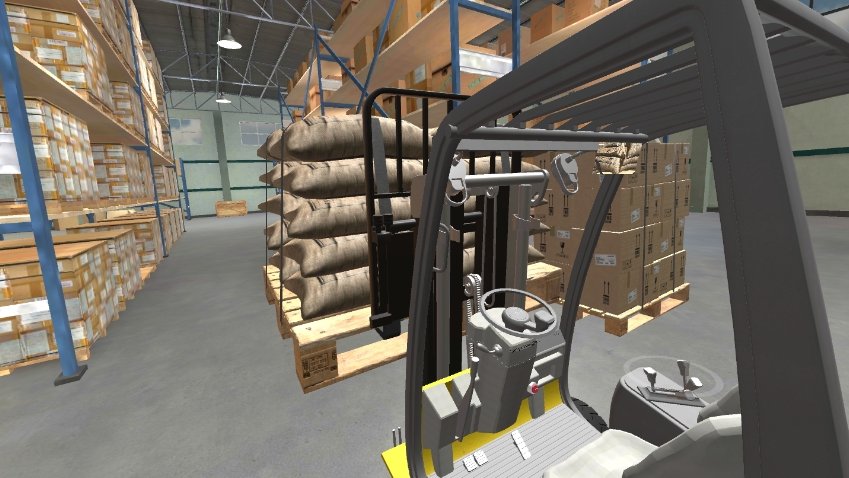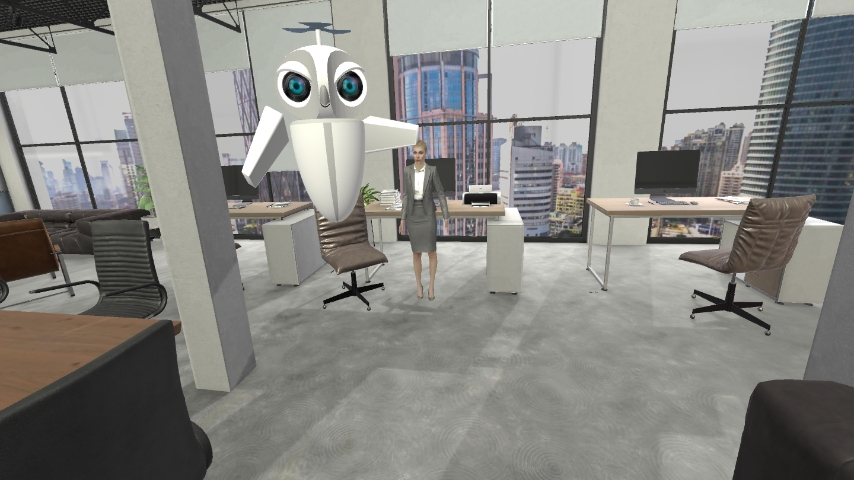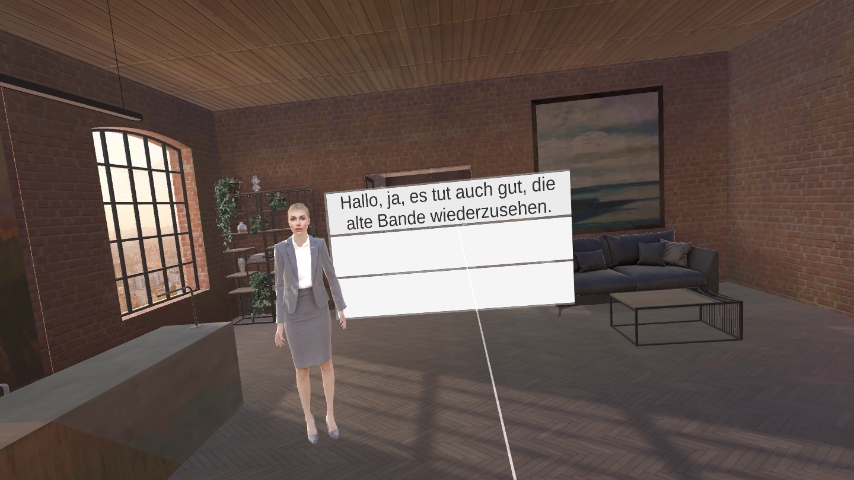
EXPAND+ER WB³ Showcase development field III: Digitally enriched continuing education offerings
AI-supported learning offerings
So far, the project has developed application scenarios in particular in the area of "Development and testing of teaching and learning offerings supported by artificial intelligence (AI)". The partners are working on the implementation and expansion of modular, digitally-enriched continuing education offerings. In doing so, these learning process pilots (LPP) open up new target groups and perspectives for continuing education. In the project, there was a lively exchange with the VR-technological joint partner i-mmersive on the development and testing of teaching and learning offerings supported by artificial intelligence (AI) (VR environment). The educational service providers were able to gain extensive insights and opportunities for implementing educational offerings with new technologies, so that these suggestions could be incorporated into the planning and development of the LPP.
Learning Process Pilots: Ideas & Implementation
The project partners are working on a larger number of learning process pilots, some of which can already be presented here. It is important to us that the process of acquiring knowledge and skills using technological approaches is designed to fund enjoyment and motivation for learning among participants. Our education managers bring their experience from seminars and combine it with the experience of developers of educational software, virtual reality (VR) technologies and the use of artificial intelligence.
In the following, we would like to introduce our learning process pilots ("LPP"):
1. learning process pilot "Forklift".
Project partners: TÜV Rheinland Akademie GmbH, Cottbus, LE Commsulting GmbH, Trebbin, i-mmersive GmbH, Berlin
Our LPP consists, like the classic forklift driver's license, of a theoretical and a practical part. The theory part was designed together with LE Commsulting and an instructor from the warehouse & logistics department of the TÜV Rheinland Academy. A live event, a self-learning module and a final exam were created for this purpose. We developed the practical part together with i-mmersive and a trainer. Here, learners can operate the forklift themselves in a VR environment and complete various extensive practical exercises.
2. learning process pilot "project management
Project partners: Brandenburg University of Technology Cottbus-Senftenberg (BTU), Cottbus, LE Commsulting GmbH, Trebbin, i-mmersive GmbH, Berlin
In the project management learning process pilot, we are working with the Quality Management chair to make the subject more accessible via alternative learning paths. For this purpose, an interactive project description assistant has already been implemented as a website. In addition, a VR world and a VR tour are currently being created. In the VR world, learners are taught the basic concepts of project management via a novel dialog mechanism. This is followed by a query of competencies supported by artificial intelligence. The VR tour deals with the history of project management and aims to make it tangible through the specifics of various projects.
A screencast was produced for the LPP "Project Management", which describes the advantages of assistance systems in conveying standardized processes. In the cast, the element of the "project description assistant" is used as a demonstrator.
3. learning process pilot "police
Project partners: Brandenburg University of Technology Cottbus-Senftenberg (BTU), Cottbus, LE Commsulting GmbH, Trebbin, i-mmersive GmbH, Berlin
In cooperation with the Brandenburg Police University, courses on the topic of traffic law are being developed, in which interactive virtual 360° tours, live quizzes and also surveys with drones are being implemented. It is planned to create a connection of social learning and interactive situations. Furthermore, we would like to review how artificial intelligence can be used to generate questions and answers from technical texts for quiz questions.
4. learning process pilot "competence assessment
Project partners: Grone-Bildungszentren gGmbH, Berlin, LE Commsulting GmbH, Trebbin, i-mmersive GmbH, Berlin
The central idea of our first learning process pilot is to enable trainees and retrainees to determine and compare their levels of the required practical vocational competencies by means of self-assessments and assessments by others. This should give the retrainees the opportunity to see how their competencies have improved over the course of their retraining and to work on their respective competencies.
5. learning process pilot "The 1st day
Project partners: Grone-Bildungszentren gGmbH, Berlin, LE Commsulting GmbH, Trebbin, i-mmersive GmbH, Berlin
The aim of this learning process pilot is to give retrainees the opportunity to get to know the everyday life of an office management assistant in various scenarios by means of virtual reality. In order to master the challenge, the students have to apply the skills they have acquired during their retraining.
6. learning process pilot "Communication & conflict management for training specialists
Project partners: IHK-Projektgesellschaft mbH Ostbrandenburg, Frankfurt (Oder), i-mmersive GmbH, Berlin
The topics of communication & conflict are important in everyday training. Therefore, it is important that training specialists continue their education accordingly. In seminars, theoretical knowledge is combined with practical exercises in which participants take on roles. With our learning process pilot, participants can learn how to recognize conflicts in different forms and which strategies can be used to de-escalate them. The practical exercise takes place in virtual space. For this purpose, a tool was developed together with the company i-mmersive GmbH in order to train conflict de-escalation practically with VR glasses. The use of VR in training offers the advantage that participants can enter an immersive environment and have realistic experiences - regardless of when and where the training takes place.
7. learning process pilot "knowledge update learning and working methodology" for training personnel and trainers
Project partners: IHK-Projektgesellschaft mbH Ostbrandenburg, Frankfurt (Oder), LE Commsulting GmbH, Trebbin
In the daily training routine there is on the one hand the challenge to implement the training plan methodically and didactically correct, on the other hand to recognize difficult training situations and to solve them constructively. With the selection and development of the learning process pilot "Knowledge Update", we provide selected content oriented to the AEVO: Framework of the training, motivation, learning techniques, time and topic planning, learning methods/media, communication and presentation. With flashcards, the contents can be quickly and concisely grasped or repeated. With a quiz there is the possibility of self-reflection. The knowledge update is available as a web version and app for Android and iOS Systems and was developed in collaboration with LE Commsulting (QuizAcademy). The training personnel can be provided with a medium with which they can activate/repeat knowledge flexibly, quickly and independent of location to carry out the training as needed.
8. learning process pilot "Sustainability - 17 SDGs (Sustainable Development Goals)".
Project partner: IHK-Projektgesellschaft mbH Ostbrandenburg, Frankfurt (Oder), LE Commsulting GmbH, Trebbin.
In 2015, the 17 Sustainable Development Goals (SDGs) were adopted by the UN as part of the 2023 Agenda for Sustainable Development. The SDGs provide a comprehensive framework for sustainable development. They identify global challenges, have a positive impact on people and planets, and fund partnership and collaboration. The 17 Sustainable Development Goals serve as a guide for governments and organizations. Developments on the topic of sustainability support SMEs towards a sustainable transformation of the economy. For this reason, it is important to know the goals and their meaning in order to find starting points for the own implementation of the transformation in the company. In addition, it is also important to take the young people along on this path, in accordance with the new standard vocational training position "environmental protection and sustainability". In cooperation with LE Commsulting, the content of the 17 SDGs with the corresponding subgoals was implemented in the form of learning cards and quizzes. The flashcards and quiz can be used as a web version and as an app for Android and iOS systems.
Competent VR hardware use
One of the most important prerequisites for the successful use of VR in education is that every user can use VR and AR hardware purposefully and safely without major difficulties. VR glasses differ only slightly in their mode of operation and usually come with two controllers. The menu navigation is based on smartphones and tablets. Learning and operating the mechanics should not be particularly complicated for most people and can be mastered without problems after a short familiarization period. To ensure that even untrained and less tech-savvy users can easily find their way around, it is important to focus on simplicity when designing learning applications. A linear menu navigation from the start of the application to the beginning of the learning unit should be guaranteed. Nevertheless, a short introduction to the operation of the glasses and the learning application is useful. In the courses themselves, self-directed learning should be practiced. This means that no teacher has to control and accompany the processes. Nevertheless, some form of control is necessary, e.g. by a programmed character and clear instructions by arrows or texts, as they are common in many computer games.
Testing & trial
Learning process pilots at the BTU are currently being developed and, in parallel, the implementation and evaluation phases are being worked out from the structural concept in order to be able to derive approaches for the involvement of the test participants. In addition to the involvement of companies from the company survey, learners and students will be able to test the learning process pilots and provide feedback. The trial phase is being organized in a staggered manner at the BTU.
In some cases, initial versions of individual products have been operationally used and evaluated by stakeholders in order to use the results to further develop the products.
In general, the methodology for data collection was determined as a result of the scientific research conducted in 2022. The framework of the survey concept was also defined. In this context, the trial participants will be surveyed at different points in time according to factors (motivation, exposure to digital technologies, interest in learning context, well-being of the learning experience, likelihood of re-use, recommendation to third parties, usefulness, effective usability, usefulness and open comments) in self-assessment (scale from 1 to 5). The timing of the surveys (z) depends on the trial participants' experience with digital tools in continuing education (n) (zn, z0=no experience, z1=some experience, ..., zn=n experience).



